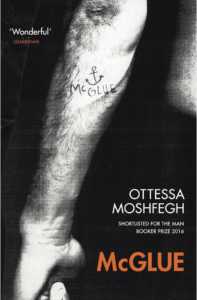
McGlue
By Julz Levesque | Arts & Culture Editor
McGlue (2014) is a short 144-page novella written by Ottessa Moshfegh. It’s set in 1851 in Salem Massachusetts and tells the dizzying story of a sailor who wakes up injured, with his head reeling, and who stays perpetually drunk or hungover throughout the entirety of the story. He might have killed his best and only friend Johnson. The story is told through his unique voice as he struggles to remember what happened the night of the supposed murder. Struggling with his condition and alcoholism, the story takes you through his journey through the stages of grief and the months leading up to his eventual conviction. Hazy with denial, McGlue tries to remember.
This novella is truly a Moshfeghian feat. Her absurdly dark and compelling style shines in McGlue as the story of an unlikable and crude sailor unravels into one of mystery, morality, and acceptance. What I find so frustratingly fantastic about Moshfegh’s writing, is how she continuously writes debauched unlikable characters yet infuses their stories with so much humanity that you cannot help but feel a pang of sympathy for them. Her stories are here to remind us that there is not just good and evil. That one person cannot simply be purely good or purely bad. She challenges us to look at the characters outside of these boxes and in turn, we look within ourselves and our own morality. She writes with such a contradiction that the complexity of her stories places the audience as a judge.
In an interview with Rumpus Book Club, Moshfegh was asked where the character of McGlue came from to which she responded, “McGlue’s character is based on a man whose story I found in a New England newspaper from around 1850. The article announced his acquittal. He’d been on trial for murder.” Moshfegh is an author born in Boston, Massachusetts, so many of her novels have a New England lore or feel which is why I enjoy them so much. I’ve grown up in New England pretty much all my life. I find myself really gravitating towards gothic or darker works and Moshfegh’s writing satiates those interests and aspects of my identity.
I really find myself captivated by media that focuses on morality and different philosophies so when I read McGlue I was reminded of the short novella The Stranger by Albert Camus. I loved this story and felt that both of them complimented each other and had so many similarities. The Stranger follows an indifferent French man named Meursault after his mother’s death and the events that lead up to him killing an Arab man on an Algerian beach without any other motive except for the scorching sun blinding him. The absurdist story unravels as he’s sentenced to death for his crimes and only towards the end does Mersault begin to accept his fate, reflect on his past, fear death, and think of his mother tenderly.
Both these novellas showcase dislikable and crude men whose stories are bound by the consequences of murder. Moshfegh focuses on sexuality and internalized homophobia in the midst of grief whilst Camus portrays absurdist philosophy within a man’s grief. The stories study the human condition as both men near their fate and come to terms with their circumstances.
I apologize as I’ve gotten off topic but if you have read The Stranger I wouldn’t see why you wouldn’t like McGlue but I digress. I’ll continue now… The writing and pacing of Moshfegh’s work was fantastic. It gives the audience the feeling of being drunk alongside him as he phases in and out of an intoxicated state aboard a ship. His thoughts are scattered, they stumble, conflict, and contradict each other. It’s like being in his mind experiencing what he’s living and what he remembers and it’s absolutely tragic. Essentially the audience is given sight through the eyes of a drunk broken-hearted man as he comes to terms with his life, grief, and sexuality. This novella was truly so fantastic and compelling that I genuinely didn’t want to put it down. Moshfegh’s writing style in this is short, to the point, and simple but the words carry so much cruelty and anguish. I certainly enjoyed reading McGlue but it may not be for everyone.
